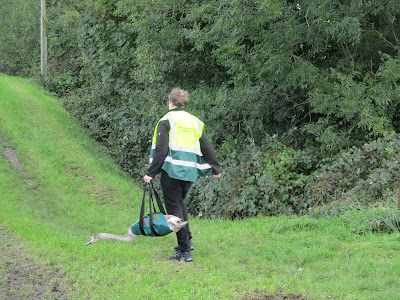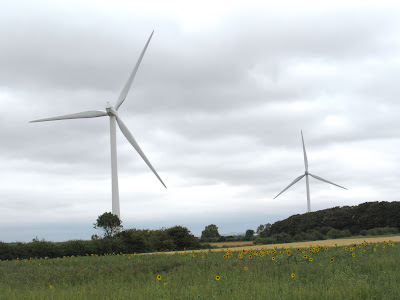Salmon 'farm' company confident of bright future for ambitious Cleethorpes venture
 |
| Site of the proposed salmon farm is close to Blundell Park (centre left) - home of Grimsby Town FC |
CONTROVERSY is likely to rage over the proposed indoor salmon 'farm' in Cleethorpes well into 2024 and beyond.
The firm behind the project is London-based Aquacultured Seafood Ltd which is currently approaching potential funders for the £75- million project which has been earmarked for scrubland between Blundell Park and the Humber estuary wall.
Among its pledges are:
* Creation of 80 jobs and new skills opportunities
* Supply of "healthy, nutritious and responsibly-farmed" salmon - 5,000 tonnes per annum
* Construction work for local contractors
Opponents claim that the intensive rearing methods will be distressing to the fish.
When the proposal came before last month's meeting of North East Lincolnshire Council's planning committee - where it was approved - ward councillor Cllr Sophia Farren queried how many of the jobs would be for local people given that Grimsby Institute currently offers no food degree.
Cllr Kevin Shutt warned that "millions of fish might die" if there were to be an extended power cut and no back-up electricity supply were available.
However, it has since emerged that the application does make provision for back-up generators to be installed.
In an attempt to address most, if not all, of the concerns, Aquacultured Seafood Ltd has issued a question-and answer document which reads as follows:
Will you be discharging waste into the Humber?
Any water returned to the Humber will be correctly cleaned and filtered to ensure that the water is returned in a state that is at least as clean as it was when first extracted.
Will the water treatment really remove all of the chemicals?
Onshore aquaculture enables a more controlled environment that allows for optimised fish welfare. This includes less use of medicines and chemicals compared with offshore fish farms. Despite that, any waste water from the process is cleaned and filtered, ensuring that it is at least as clean as when it was extracted before being returned to the sea. Regular monitoring and analysis of water quality forms part of the process.
If the water is clean when it goes out, why don’t you re-use it?
In Recirculating Aquaculture Systems (RAS), which we’re proposing for this development, some of the treated waste water is recycled within the processing system and returned to the tanks to be re-used. However, for optimum fish welfare, a percentage of water exchange is required.
Will the tanks be totally separate from the sea?
Yes. The proposed development, which contains the tanks is a completely enclosed, indoor facility.
If the salmon becomes contaminated, will the waste be poured into the estuary, affecting the Humber?
No. We are continually learning from other established onshore aquaculture facilities to minimise any risk of contamination, as it is in our best interests to prioritise the welfare of our salmon to produce healthy, nutritious fish. However, if ever there is a contamination incident, any affected tanks will be immediately isolated from the other tanks in the facility and the waste will be properly and carefully disposed of by our specialist fish waste processing partners.
Is this going to create extra noise and vibration at all hours of the day and night?
No. Specialist, independent consultants have confirmed that noise from the proposed development will be low impact to all residential dwellings at all times. That means that the noise generated will not be noticeably louder than the current level of background noise.
Will the smell be awful?
A specialist, independent consultant has identified three possible sources of odour that could be generated, but all three will be contained within the facility.
1. Fish processing waste will be separately stored in sealed, refrigerated containers and securely transported to nearby processors who already have established facilities.
2. Solids from waste water treatment will be stored in a sealed container and removed from the site daily by credible waste management partners.
3. Water treatment and exhaust air is continuously recycled and cleaned and carbon filtered when discharged to external air.
If that is true, why do people say that they have experienced foul smells from fish farms in Scotland?
The facilities that are being referred to in Scotland are offshore aquaculture farms which operate differently from the proposed development. The proposals for Grimsby are for an onshore Recirculating Aquaculture System (RAS) which operates in a closed, indoor facility.
How will you stop chemicals and hormones transferring to local water via the waste water?
One of the benefits of the proposed Recirculating Aquaculture System (RAS) is the lack of chemicals and hormones introduced into the system. In addition, all waste water is thoroughly cleaned before being returned to the Humber to ensure that it is at least as clean as when it was extracted.
Will all the jobs be low paid and low skilled?
On the contrary, the facility will create new skills opportunities for local people, which will be delivered via local education and training support.
Will the jobs be available to local people or will staff be shipped in like with renewables?
We are committed to employing local people wherever possible. Where local skills gaps exist, we are working with local education providers to introduce new, specialist skills training to the region for future employment.
Why build this on our doorstep to feed middle-class families in Asia? Can’t they build their own fish farm if they want one?
While increasing demand in Asia is helping to drive growing, global demand for healthy, nutritious seafood, this development is not about supplying Asian demand. This is an opportunity for improving UK food security and reducing our reliance on overseas imports.
Most of the fish currently processed in Great Grimsby is transported in from Norway and Scotland. All of the fish from the proposed development would be processed within a two-mile radius, reducing food miles, increasing freshness at the point of delivery to the processor and supporting local businesses and jobs.
Why is the site so close to residential dwellings? Isn’t there somewhere more suitable?
The site has been selected for a variety of reasons that make it the ideal location for the proposed development. These include proximity to fresh and saline water sources, nearby location of food and waste processors, and strong, existing, local transport links.
Why was there no Environmental Impact Assessment for this proposed development?
Having followed all of the correct procedures and consulting with the necessary bodies, it was determined that no EIA was required for the proposed development.
What will happen to the birds and wildlife that use this land as their natural habitat?
Extensive ecology reports relating to the sites have been ongoing since 2001. All findings and recommendations are being carefully considered, along with measures to minimise the impact of the development on wildlife wherever possible.
The proposed site layout includes retention and protection of approximately 2ha of existing local wildlife sites habitats; trees, scrub and grassland as a strip alongside the railway line boundary.
Where loss of designated wildlife habitats does occur, off-site mitigation options will be sought with support from credible and trustworthy partners.
ASL says it hopes to start construction during 2024.
* Top photo courtesy of ASL
** See also: https://Grimsbynews.blogspot.com












.jpg)



